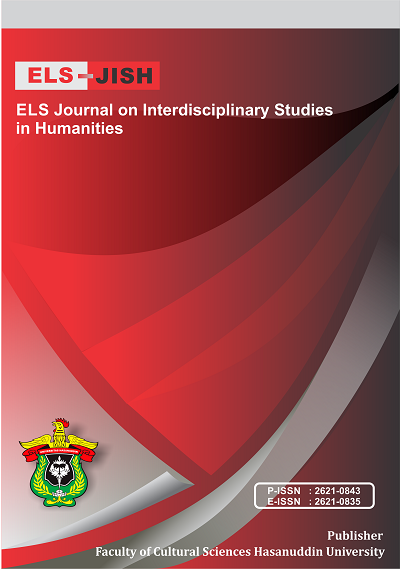Honorific Sunda Language in Buru Island
DOI:
https://doi.org/10.34050/elsjish.v6i1.25965Keywords:
Honorifics, Gender, Sundanese Language RushAbstract
This study tries to describe the honorific usage in Sunda language on Buru Island as it relates to gender. This study is qualitative in nature. A modest level of participant observation, recording, and recording procedures were used to gather the data. The study's findings revealed that among other things, (1) honorifics on the male sex include honorifics for brothers in the form pamegut, honorifics for other brothers in the form aa', and honorifics for younger brothers in the form ujang; honorifics for husbands in the form caroge, bapak, and ayah; honorifics for fathers in law in the form mitoha and bapak; honorifics for young adults in the form jaja (2) Honorifics on the fa male sex include garwa, mama, and ibu for the wife, nyai for girls, teteh and neng for sisters and younger sisters, mitoha, mama, and ibu for the mather in law, bibi for the aunt, ema for the mother, nini for the grandmother, and unyut for the parents of the grandma.
References
Alwasilah, C. (2008). Filsafat Bahasa dan Pendidikan. Rosdakarya.
Dittmar, N. (1976). Sociolinguistics. Edward Arnold.
Fatimah, F., Susiati, S., Jelira, N. F., Umanailo, C. B., & Tahir, S. Z. Bin. (2021). Environmental Ethics of Kaki Air Village Community at Teluk Kaiely District, Buru Regency. ELS Journal on Interdisciplinary Studies in Humanities, 1(3), 355–362.
Jenkins, R. (2008). Social identity. Routledge.
Kartomihardjo, S. (1988). Bahasa Cermin Kehidupan Masyarakat. P2LPTK.
Kridalaksana, H. (1982). Dinamika Tutur Sapa dalam Bahasa Indonesia. Bhratana.
Kridalaksana, H. (2001). Kamus Linguistik. PT Gramedia Pustaka Utama.
Kridalaksana, H. (2008). Kamus Linguistik (4th ed.). Gramedia.
Moleong, L. (2010). Metodologi Penelitian Kualitatif. Remaja Rosdakarya.
Nurjamily, W. O. (2015). Kesantunan Berbahasa Indonesia dalam Lingkungan Keluarga (Kajian Sosiopragmatik). Jurnal Humanika, 3(15), 34–42.
Oktavianus. (2006). Analisis Wacana Lintas Bahasa. Andalas University Press.
Sailan, Z. (2014). Pidato Ilmiah: Solidaritas dan Kesantunan Berbahasa (Telaah Pragmatik).
Sudaryanto. (1993). Metode dan Aneka Teknik Analisis Bahasa (Pengantar Penelitian Wahana Kebudayaan Secara Linguistis). Duta Wacana University Press.
Sugiyono. (2017). Metode Penelitian Kuantitatif, Kualitatif, dan R&D. Alfabeta.
Sukmawaty, S., Andini, C., & Fathu Rahman, F. (2022). The Shift of Honorifics due to The Promotion As A Government Official: Comparative Study. ELS Journal on Interdisciplinary Studies in Humanities, 5(1), 166-176. https://doi.org/10.34050/elsjish.v5i1.20817
Susiati;, S., Iye;, R., & Tenriawali, A. Y. (2018). Kesantunan Imperatif Bahasa Indonesia Suku Bajo Sampela: Pendekatan Pragmatik. Kongres Bahasa Indonesia, 234–243.
Susiati, S. (2018). Homonim bahasa kepulauan tukang besi dialek kaledupa di kabupaten wakatobi [the homonymon of tukang besi island languange in kaledupa dialect at wakatobi regency]. Totobuang, 6(1), 109–123. https://doi.org/https://doi.org/10.26499/ttbng.v6i1.72
Susiati, S., Masniati, A., Iye, R., & Buton, L. H. (2020). Kearifan Lokal Dalam Perilaku Sosial Remaja Di Desa Waimiting Kabupaten Buru. Sang Pencerah: Jurnal Ilmiah Universitas Muhammadiyah Buton, 7(1), 8–23. https://doi.org/10.35326/pencerah.v7i1.747
Susiati, S., Nurhayati, N., & Said, I. (2019). Emosi Verbal Suku Bajo Sampela. Sosial Budaya, 16(2), 114–126.
Yatim, N. (1983). Subsistem Honorifik Bahasa Makassar: Sebuah Analisis Sosiolinguistik. Departemen pendidikan dan kebudayaan direktorat jenderal pendidikan tinggi direktorat pembinaan penelitian dan pengabdian.
Zamzani. (2012). Pengembangan Alat Ukur Kesantunan Bahasa Indonesia dalam Interaksi Sosial Formal Bersemuka. Penelitian Humaniora, 17(2), 118–134.
Downloads
Published
How to Cite
Issue
Section
License
Copyright (c) 2023 Azwan Azwan, Riki Bugis, Kaharuddin Kaharuddin, Ibnu Hajar, Sumiaty Sumiaty, Susiati Susiati

This work is licensed under a Creative Commons Attribution-ShareAlike 4.0 International License.






